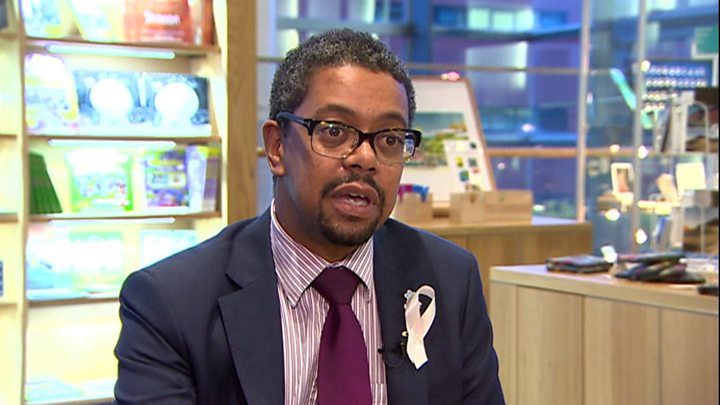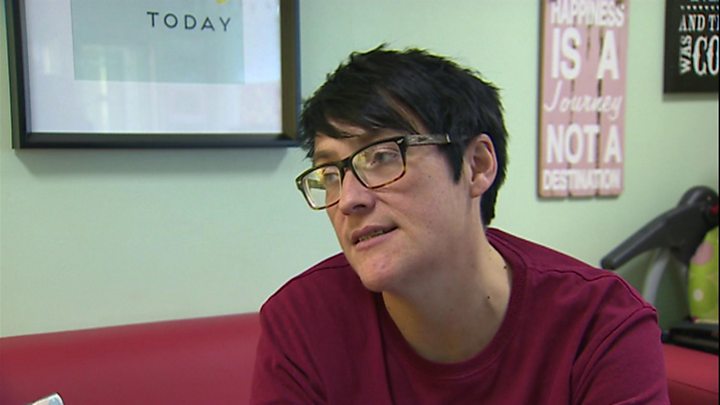Single cancer waiting times target set for NHS Wales
The current cancer waiting times targets in Wales could end up being scrapped under plans to be announced later by the Welsh health secretary.
Patients follow one of two routes to treatment depending on how a cancer is found – each with a separate waiting time target.
But there are concerns that the system does not accurately reflect how long some patients are actually waiting.
It is argued a single treatment route and target could deliver better care.
All health boards from January will begin to measure performance against a new “single cancer pathway”, so waiting times for all cancer patients can be measured in the same way, Vaughan Gething will announce in a speech to the Wales Cancer Conference in Cardiff later.
But the existing targets will continue to be published in parallel until a final decision is made.
- QA: Cancer in Wales
- Cancer survival rates improve in Wales
- Call to transform survival
- ‘Big changes’ could improve diagnosis
NHS Tracker: Check how your area is performing
Can’t find your health trust?
Browse the full list
Rather search by typing?
Back to search
Figures are assessed against targets before rounding
iframe {
height: 100vh;
}
/* Apply some default styling for core content */
.bbc-news-vj-iframe-wrapper html,
.bbc-news-vj-iframe-wrapper address,
.bbc-news-vj-iframe-wrapper blockquote,
.bbc-news-vj-iframe-wrapper body,
.bbc-news-vj-iframe-wrapper dd,
.bbc-news-vj-iframe-wrapper div,
.bbc-news-vj-iframe-wrapper dl,
.bbc-news-vj-iframe-wrapper dt,
.bbc-news-vj-iframe-wrapper fieldset,
.bbc-news-vj-iframe-wrapper form,
.bbc-news-vj-iframe-wrapper frame,
.bbc-news-vj-iframe-wrapper frameset,
.bbc-news-vj-iframe-wrapper h1,
.bbc-news-vj-iframe-wrapper h2,
.bbc-news-vj-iframe-wrapper h3,
.bbc-news-vj-iframe-wrapper h4,
.bbc-news-vj-iframe-wrapper h5,
.bbc-news-vj-iframe-wrapper h6,
.bbc-news-vj-iframe-wrapper noframes,
.bbc-news-vj-iframe-wrapper ol,
.bbc-news-vj-iframe-wrapper p,
.bbc-news-vj-iframe-wrapper ul,
.bbc-news-vj-iframe-wrapper center,
.bbc-news-vj-iframe-wrapper dir,
.bbc-news-vj-iframe-wrapper hr,
.bbc-news-vj-iframe-wrapper menu,
.bbc-news-vj-iframe-wrapper pre {
display: block;
}
.bbc-news-vj-iframe-wrapper li {
display: list-item;
padding: 0.2em;
}
.bbc-news-vj-iframe-wrapper head {
display: none;
}
.bbc-news-vj-iframe-wrapper table {
display: table;
}
.bbc-news-vj-iframe-wrapper tr {
display: table-row;
}
.bbc-news-vj-iframe-wrapper thead {
display: table-header-group;
}
.bbc-news-vj-iframe-wrapper tbody {
display: table-row-group;
}
.bbc-news-vj-iframe-wrapper tfoot {
display: table-footer-group;
}
.bbc-news-vj-iframe-wrapper col {
display: table-column;
}
.bbc-news-vj-iframe-wrapper colgroup {
display: table-column-group;
}
.bbc-news-vj-iframe-wrapper td,
.bbc-news-vj-iframe-wrapper th {
display: table-cell;
}
.bbc-news-vj-iframe-wrapper caption {
display: table-caption;
}
.bbc-news-vj-iframe-wrapper th {
font-weight: bolder;
text-align: center;
}
.bbc-news-vj-iframe-wrapper caption {
text-align: center;
}
.bbc-news-vj-iframe-wrapper h1 {
font-size: 2em;
margin: 0.67em 0;
}
.bbc-news-vj-iframe-wrapper h2 {
font-size: 1.5em;
margin: 0.75em 0;
}
.bbc-news-vj-iframe-wrapper h3 {
font-size: 1.4em;
margin: 0.83em 0;
margin-top: 2em;
}
.bbc-news-vj-iframe-wrapper h4,
.bbc-news-vj-iframe-wrapper p,
.bbc-news-vj-iframe-wrapper blockquote,
.bbc-news-vj-iframe-wrapper ul,
.bbc-news-vj-iframe-wrapper fieldset,
.bbc-news-vj-iframe-wrapper form,
.bbc-news-vj-iframe-wrapper ol,
.bbc-news-vj-iframe-wrapper dl,
.bbc-news-vj-iframe-wrapper dir,
.bbc-news-vj-iframe-wrapper menu {
margin: 1.12em 0;
}
.bbc-news-vj-iframe-wrapper h5 {
font-size: .83em;
margin: 1.5em 0;
}
.bbc-news-vj-iframe-wrapper h6 {
font-size: .75em;
margin: 1.67em 0;
}
.bbc-news-vj-iframe-wrapper h1,
.bbc-news-vj-iframe-wrapper h2,
.bbc-news-vj-iframe-wrapper h3,
.bbc-news-vj-iframe-wrapper h4,
.bbc-news-vj-iframe-wrapper h5,
.bbc-news-vj-iframe-wrapper h6,
.bbc-news-vj-iframe-wrapper b,
.bbc-news-vj-iframe-wrapper strong {
font-weight: bolder;
}
.bbc-news-vj-iframe-wrapper blockquote {
margin-left: 2.5em;
margin-right: 2.5em;
}
.bbc-news-vj-iframe-wrapper i,
.bbc-news-vj-iframe-wrapper cite,
.bbc-news-vj-iframe-wrapper em,
.bbc-news-vj-iframe-wrapper var,
.bbc-news-vj-iframe-wrapper address {
font-style: italic;
}
.bbc-news-vj-iframe-wrapper pre,
.bbc-news-vj-iframe-wrapper tt,
.bbc-news-vj-iframe-wrapper code,
.bbc-news-vj-iframe-wrapper kbd,
.bbc-news-vj-iframe-wrapper samp {
font-family: monospace;
}
.bbc-news-vj-iframe-wrapper pre {
white-space: pre;
}
.bbc-news-vj-iframe-wrapper button,
.bbc-news-vj-iframe-wrapper textarea,
.bbc-news-vj-iframe-wrapper input,
.bbc-news-vj-iframe-wrapper select {
display: inline-block;
}
.bbc-news-vj-iframe-wrapper big {
font-size: 1.17em;
}
.bbc-news-vj-iframe-wrapper small,
.bbc-news-vj-iframe-wrapper sub,
.bbc-news-vj-iframe-wrapper sup {
font-size: 0.83em;
}
.bbc-news-vj-iframe-wrapper sub {
vertical-align: sub;
}
.bbc-news-vj-iframe-wrapper sup {
vertical-align: super;
}
.bbc-news-vj-iframe-wrapper table {
border-spacing: 2px;
}
.bbc-news-vj-iframe-wrapper thead,
.bbc-news-vj-iframe-wrapper tbody,
.bbc-news-vj-iframe-wrapper tfoot {
vertical-align: middle;
}
.bbc-news-vj-iframe-wrapper td,
.bbc-news-vj-iframe-wrapper th,
.bbc-news-vj-iframe-wrapper tr {
vertical-align: inherit;
}
.bbc-news-vj-iframe-wrapper s,
.bbc-news-vj-iframe-wrapper strike,
.bbc-news-vj-iframe-wrapper del {
text-decoration: line-through;
}
.bbc-news-vj-iframe-wrapper hr {
border: 1px inset;
}
.bbc-news-vj-iframe-wrapper ol,
.bbc-news-vj-iframe-wrapper ul,
.bbc-news-vj-iframe-wrapper dir,
.bbc-news-vj-iframe-wrapper menu,
.bbc-news-vj-iframe-wrapper dd {
margin-left: 1.12em;
padding-left: 1.12em;
}
.bbc-news-vj-iframe-wrapper ol {
list-style-type: decimal;
}
.bbc-news-vj-iframe-wrapper ul {
list-style-type: disc;
}
.bbc-news-vj-iframe-wrapper ol ul,
.bbc-news-vj-iframe-wrapper ul ol,
.bbc-news-vj-iframe-wrapper ul ul,
.bbc-news-vj-iframe-wrapper ol ol {
margin-top: 0;
margin-bottom: 0;
}
.bbc-news-vj-iframe-wrapper u,
.bbc-news-vj-iframe-wrapper ins {
text-decoration: underline;
}
.bbc-news-vj-iframe-wrapper center {
text-align: center;
}
.bbc-news-vj-iframe-wrapper :link,
.bbc-news-vj-iframe-wrapper :visited {
text-decoration: underline;
}
.bbc-news-vj-iframe-wrapper :focus {
outline: thin dotted invert;
}
.bbc-news-vj-iframe-wrapper a {
font-size: 1em;
}
.bbc-news-vj-iframe-wrapper iframe {
-webkit-overflow-scrolling: touch; /* Allow scroll when using VoiceOver */
}
]]>
The move, which has been under consideration for many years, is being welcomed by cancer experts and charities.
However, three years ago, when the single pathway was first trialled, opposition parties claimed it was an attempt by the Welsh Government to “move the goal posts” and “change targets it could not meet”.

This is how things work:
- At the moment, if a patient is referred to a specialist as an urgent suspected cancer case then 95% of confirmed cases should start treatment within 62 days
- The second target involves patients who might be already being investigated for a health problem but that is not initially considered to be cancer
- But if it subsequently emerges those patients do have the disease, then 98% should start treatment within 31 days of a treatment plan being agreed. Medical experts are worried there might be hidden delays before patients reach this point.
- The new single pathway would aim to start counting all patients from the point of suspicion of cancer – including the date of referrals from a GP or as soon as cancer is on the radar.
The 62-day target has not been met on an all-Wales basis since 2008 – and latest figures published today are down on the previous month – but the Welsh NHS has had more success in achieving the 31-day target.
Overall, performance on cancer waiting times has remained stable in recent years despite an estimated 1.5% a year increase in demand for cancer care.
However, Mr Gething conceded that, despite some improvement, the NHS has not met the existing targets often enough.
If the new system works, Mr Gething said the “ambition” would be to replace the current 62 and 31-day targets with a single cancer waiting time target – although it is not clear yet what it will be.
It is understood, the health secretary will stress in his speech the changes are not “about disguising bad news”.
However, he expects implementing the reform will be “difficult” and “bumpy”.
The patient’s view

Nurse Becky Thomas, from Merthyr Tydfil, sees the issue as both patient and health professional and would welcome anything to speed up diagnosis.
She had vague symptoms when she saw her GP but was only diagnosed with bowel cancer later when she confided in a colleague in hospital.
Ms Thomas had surgery and chemotherapy and is now cancer free.
“I’ve been asked ‘how long is it acceptable to wait?’ Depending where you are on that journey, you will give a different answer,” she said.
“It’s difficult to say you will need to do it in five days, you might not be able to if you have to have a number of tests; they take time. I appreciate that, but I would welcome anything to provide that impetus to make things more at the forefront of people’s minds.”
-
17,201 started their treatment
-
93% were treated within target
-
72% diagnosed between 2010 and 2014 survived at least one year
-
93% rated their care positively
-
1,800 more people treated within target time compared to five years ago
If the current targets are eventually scrapped, it is also argued it could be more difficult to compare cancer performance in Wales with other UK countries.
This follows a significant change two years ago in the way ambulance response times are measured.
The announcement comes as the Welsh Government publishes its first annual progress report on its updated cancer delivery plan.
Mr Gething said this shows performance has remained stable despite increasing demand with improvements in some areas.
But Conservative health spokeswoman Angela Burns said in the absence of any detail, they could not support moves towards a single cancer treatment route.
“Any changes to this end would need to be piloted for a minimum of 12 months with cast-iron assurances that patients would not be negatively impacted during this trial period,” she said.